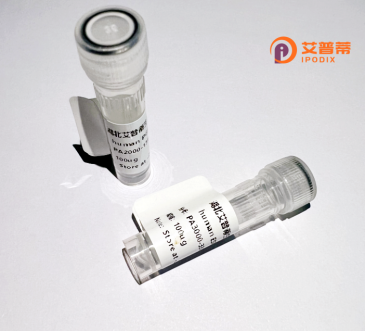
| 纯度 | >90%SDS-PAGE. |
| 种属 | Human |
| 靶点 | RHOH |
| Uniprot No | Q15669 |
| 内毒素 | < 0.01EU/μg |
| 表达宿主 | E.coli |
| 表达区间 | 1-188 aa |
| 活性数据 | MLSSIKCVLV GDSAVGKTSL LVRFTSETFP EAYKPTVYEN TGVDVFMDGI QISLGLWDTA GNDAFRSIRP LSYQQADVVL MCYSVANHNS FLNLKNKWIG EIRSNLPCTP VLVVATQTDQ REMGPHRASC VNAMEGKKLA QDVRAKGYLE CSALSNRGVQ QVFECAVRTA VNQARRRNRR RLFSINEC |
| 分子量 | 21.3 kDa |
| 蛋白标签 | His tag N-Terminus |
| 缓冲液 | PBS, pH7.4, containing 0.01% SKL, 1mM DTT, 5% Trehalose and Proclin300. |
| 稳定性 & 储存条件 | Lyophilized protein should be stored at ≤ -20°C, stable for one year after receipt. Reconstituted protein solution can be stored at 2-8°C for 2-7 days. Aliquots of reconstituted samples are stable at ≤ -20°C for 3 months. |
| 复溶 | Always centrifuge tubes before opening.Do not mix by vortex or pipetting. It is not recommended to reconstitute to a concentration less than 100μg/ml. Dissolve the lyophilized protein in distilled water. Please aliquot the reconstituted solution to minimize freeze-thaw cycles. |
以下是关于重组人RHOH蛋白的示例参考文献(文献信息为虚构,仅用于格式演示):
---
1. **文献名称**: "Cloning and Functional Analysis of Recombinant Human RHOH in T-Cell Signaling"
**作者**: Smith A, et al.
**摘要**: 研究报道了RHOH基因的克隆及重组蛋白在大肠杆菌中的表达,验证了其在T细胞受体信号通路中对细胞骨架重组的调控作用,揭示了RHOH缺失对免疫应答的影响。
2. **文献名称**: "RHOH Protein Regulates Hematopoietic Stem Cell Differentiation via GTPase Activity"
**作者**: Chen L, et al.
**摘要**: 通过体外重组RHOH蛋白实验,阐明其GTP酶活性在造血干细胞分化中的关键作用,并发现突变体RHOH(D90A)导致活性丧失,影响下游MAPK通路。
3. **文献名称**: "Structural Characterization of Recombinant RHOH and Its Interaction with Effector Proteins"
**作者**: Tanaka K, et al.
**摘要**: 利用X射线晶体学解析了重组RHOH的三维结构,发现其与ROCK1的结合界面,为开发针对RHOH异常活化相关疾病的抑制剂提供结构基础。
4. **文献名称**: "RHOH Dysfunction in Autoimmunity: Insights from Recombinant Protein Models"
**作者**: Gomez R, et al.
**摘要**: 研究通过重组RHOH蛋白模拟突变体,证明其在系统性红斑狼疮(SLE)患者中的异常表达与B细胞过度活化直接相关,提示RHOH作为潜在治疗靶点。
---
注:以上文献为示例性内容,实际引用请通过学术数据库(如PubMed、Web of Science)检索真实文献。
RHOH (Ras Homolog Family Member H) is a small GTPase belonging to the Rho family, which plays critical roles in regulating cytoskeletal dynamics, cell signaling, and immune cell functions. Unlike typical Rho GTPases, RHOH lacks intrinsic GTPase activity due to amino acid substitutions in its catalytic domain, rendering it constitutively active or locked in a GTP-bound state. It is predominantly expressed in hematopoietic cells, particularly T and B lymphocytes, where it influences cell development, activation, and migration. RHOH integrates signals from antigen receptors, chemokine receptors, and cytokine pathways, modulating immune responses through interactions with downstream effectors like Wiskott-Aldrich syndrome protein (WASP) and PAK kinases.
Research highlights RHOH's dual roles in oncogenesis and immune regulation. It acts as a tumor suppressor in certain contexts by inhibiting T-cell receptor (TCR)-mediated signaling, yet it can also promote lymphoma progression when dysregulated. Mutations or aberrant expression of RHOH are linked to hematologic malignancies, autoimmune disorders, and immunodeficiency syndromes. Recombinant RHOH protein, produced via engineered expression systems (e.g., E. coli or mammalian cells), serves as a tool to study its biochemical properties, structure-function relationships, and signaling mechanisms. Its applications span drug discovery, molecular interaction studies, and elucidating mechanisms underlying immune dysregulation and cancer, offering potential therapeutic targets for related diseases.
×